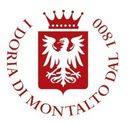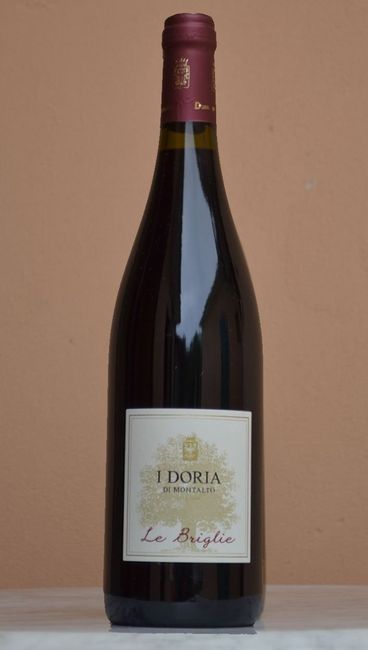Fine Rieslings from Oltrepò,in the province of Pavia
Tradition is the starting point for the production of wines from Oltrepò Pavese's Riesling grapes. Techniques for harvesting and storing wines in the cellar have been handed down for over seven generations in this picturesque area. The Doria family has been preserving ancient production techniques since the 1800s, maintaining the production of ancient wines with an unmistakable aroma.
"Le Briglie"
Bonarda dell'Oltrepo Pavese organic still red wine
Grapes: 100% Croatina with over-ripening
Adriano Doria is the father of the current winery owners, and a viticultural researcher who has always believed in the method of producing grapes using sustainable techniques. This included recovering old native varieties for the production of great wines. He selected the native Croatina variety currently in production at the Doria winery. A variety that, having been selected over the centuries, have been able to express the territory at its best without any intervention other than environmentally friendly. Croatina
is the prince of the 169 native vines in the Oltrepò Pavese. A vine that is generous in quality, resistant to disease due to its high polyphenol content and the effects of late ripening, it produces wines that are rich in polyphenols and colour as well as having a good alcohol content. The grape harvest follows the Nebbiolo; in fact, after careful management of the vineyard with permanent grassing and only winter dunging. Given the best biological techniques in use, it reaches maturity at the end of October. After careful grape selection, they are picked by hand and placed in boxes.
In the cellar, processing is traditional and carried out without the aid of impacting techniques and without the use of selected yeasts; the careful processing, according to organic logic, does not foresee the use of any oenological product. Vinification is carried out using only pumping over and natural fermentation without temperature control. Malolactic fermentation takes place in a natural way and the wine matures for over 6 months before bottling, which takes place without filtration. After a short period of rest, the wine is sold at the end of April.
Descriptive notes
Its colour is deep red with strong purple notes due to the excellent ripening possible on the 45th parallel.
Its fragrance is fine, persistent, with pleasant notes of red fruit jam and a particularly delicate spicy finish combined with almond notes.
Its flavour is moderately tannic, soft, fruity with a persistent savour and aroma.
Pairing
Bonarda in pairing traditionally lends itself well with typical salami from Oltrepò, as well as spicy salami from Southern Italy and pork cooked on the grill. It is also delicious with tripe and tomato.
Original served fresh with fish soups prepared with tomato and chilli pepper.
It is also easy to pair with tomato and meat sauces.
Serving temperature: 18-20°C.
"AD"Nebbiolo organic red wine
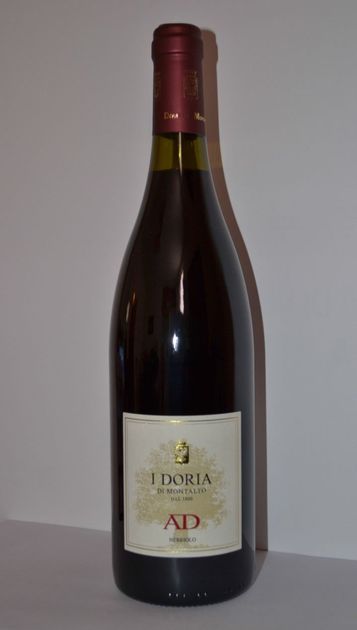
Grapes: 100% local Nebbiolo
Nebbiolo AD
The name A.D. was born in memory of Adriano Doria, a winemaker-researcher who has always believed in the method of producing grapes with sustainable techniques. This included the recovery of old native varieties for the production of great wines.
A variety that has been selected over the centuries has been able to express the territory at its best without interventions, if not environmentally friendly. This was possible when there were only preventive techniques and the care of the territory and the vineyard to obtain important oenological results. A lot of generous work has led to the recovery of our exclusive local Nebbiolo variety; after careful management of the vineyard with permanent grassing and with only winter manure, given the best biological techniques in use, it reaches maturity at the end of October. Harvesting, after careful selection of the bunches, is done manually and placed in boxes. In the cellar, the first processing is traditional and carried out without the aid of impacting techniques; the careful processing, according to organic logic, involves the use of only natural products. The vinification takes place with the use of only pumping over and natural fermentation. The malolactic fermentation takes place in tanks at controlled temperatures and is spontaneous given the low content of natural sulphites. Afterwards, it ages in tonneaux for over two years. The final phase, when the cuvée is born, involves only "fusions" from organic and natural techniques and after about six months, the wine is bottled without filtration. Available for sale after at least 1 year.
Colour:
garnet red, intense, due to the excellent ripening possible on the 45th parallel.
Fragrance:
fine, persistent, with pleasant notes of red fruit jam and a particularly delicate spicy finish.
Flavour: tannic, soft, velvety with good taste-olfactory persistence.
Alcoholic degree: 13,5% Vol.
Serving temperature: 18-20°C.
Pairing
Our long-aged AD Nebbiolo wine pairs well with game prepared both grilled and stewed, excellent with venison and game.
It is famous for its combination with mushrooms, truffles and is easy to combine with tomato and meat sauce in the kitchen.
The combination with spicy fare is interesting and it can also be paired with spicy flavours.
Martinotti Method Organic Riesling Sparkling Wine
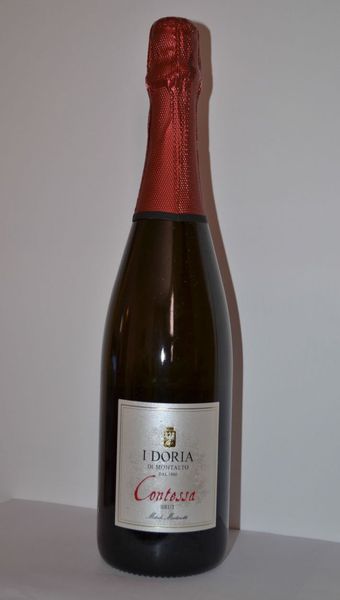
Grapes: 100% Rhine Riesling
Spumante Contessa
Sparkling wine is typical of Oltrepò, so much so that it is known in Italy as one of the best production areas for sparkling wine bases, especially for Pinot Noir, but few have any knowledge of the excellent potential for Rhine Riesling.
As early as the 18th century, Oltrepò straddled two worlds and two different wine-making cultures, Franco-Piedmontese and Austrian, conveyed by the Administration of the Lombard-Veneto Kingdom, which made the hilly Apennine territory of the Pavia area “multi-vocational”.
The unification of Italy and the political-military victory of the Savoy family effectively annulled the oenological expertise of the Austrian school even in our own home; but in a reinterpretation of sparkling wine vinification from an organic point of view, it was revealed that Rhine Riesling lends itself well to sparkling wine production due to its high starting acidity, low pH and the right alcohol content, analytical characteristics that are the key to the production of good sparkling wines.
The Austrian agronomists working with their oenological culture, in Oltrepò, found the right answers for the refined quality of their Riesling grapes and wines in the soils of the Montalto hills. The Doria family, producers of grapes and wines since 1800, and organic producers already active before the Wars of Independence, intended to re-propose a sparkling wine that wanted to tell this story and become a vestige of the Austrian occupation of Lombardy.
The careful cultivation of the vineyard in "organic" farming and the management system optimised by the long experience on very suitable soils allows for an original vinification, which has always been carried out in the company and handed down to a few and expert Masters of the cellar. It allows it to maintain high characteristics from sparkling wine and inhibit the typical aromatic characteristics of Rhenish Riesling, instead enhancing the citrus fruit notes and those of clary sage. Only very few wineries in Italy are able to offer it.
Colour:
gold with brilliant notes and light emerald green nuances.
Fragrance: highlights clear citrus notes integrated with the slight sensations of bread crust from sparkling wine fermentation with the typical vegetable and aromatic notes of Provencal herbs.
Flavour:
savoury, strongly influenced by the bubbles that highlight the acid note, long and persistent.
The recommended serving temperature is very low, even below 12°C.
Medium-term ageing in any case longer than 5 years.
Pairing
A wine with clear notes of sage, together with the notes of bread crust and the warm-acid notes of lactic acid is suitable in combination with white meat, whole fish and medium-aged cheese; delicious flavours, also due to the soils' characteristics, make the Contessa suitable during any meal. Excellent for the preparation of cocktails.
"Le Briglie"Organic Rhine Riesling
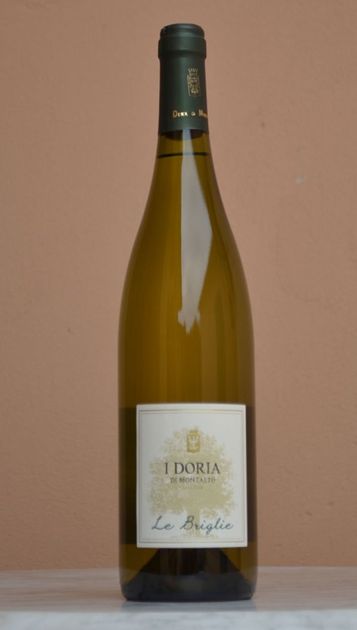
Grapes: 100% Rhine Riesling
This vine is typical of Oltrepò, so much so that it is known in Italy as one of the best production areas for sparkling wine bases, especially for Pinot Noir, but few have any knowledge of the excellent potential for Rhine Riesling. As early as the 18th century, Oltrepò straddled two worlds and two different wine-making cultures, Franco-Piedmontese and Austrian, conveyed by the Administration of the Lombard-Veneto Kingdom, which made the hilly Apennine territory of the Pavia area “multi-vocational”. The unification of Italy and the political-military victory of the Savoy family effectively annulled the oenological expertise of the Austrian school even in our own home; but in a reinterpretation of sparkling wine vinification from an organic point of view, it was revealed that Rhine Riesling lends itself well to sparkling wine production due to its high starting acidity, low pH and the right alcohol content, analytical characteristics that are the key to the production of good sparkling wines. The Austrian agronomists working with their oenological culture, in Oltrepò, found the right answers for the refined quality of their Rhine Riesling grapes and wines in the soils of the Montalto hills. The Doria family, producers of grapes and wines since 1800, and organic producers already active before the Wars of Independence, intended to re-propose a sparkling wine that wanted to tell this story and become a vestige of the Austrian occupation of Lombardy.
The careful cultivation of the vineyard in "organic" farming and the management system optimised by the long experience on very suitable soils allows for an original vinification, which has always been carried out in the company and handed down to a few and expert Masters of the cellar. It allows it to maintain high characteristics from sparkling wine and inhibit the typical aromatic characteristics of Rhenish Riesling, which, when young, displays citrus and sage aromas.
RR Le Briglie
This vine is typical of Oltrepò, so much so that it is known in Italy as one of the best production areas for sparkling wine bases, especially for Pinot Noir, but few have any knowledge of the excellent potential for Rhine Riesling. As early as the 18th century, Oltrepò straddled two worlds and two different wine-making cultures, Franco-Piedmontese and Austrian, conveyed by the Administration of the Lombard-Veneto Kingdom, which made the hilly Apennine territory of the Pavia area “multi-vocational”. The unification of Italy and the political-military victory of the Savoy family effectively annulled the oenological expertise of the Austrian school even in our own home; but in a reinterpretation of sparkling wine vinification from an organic point of view, it was revealed that Rhine Riesling lends itself well to sparkling wine production due to its high starting acidity, low pH and the right alcohol content, analytical characteristics that are the key to the production of good sparkling wines. The Austrian agronomists working with their oenological culture, in Oltrepò, found the right answers for the refined quality of their Rhine Riesling grapes and wines in the soils of the Montalto hills. The Doria family, producers of grapes and wines since 1800, and organic producers already active before the Wars of Independence, intended to re-propose a sparkling wine that wanted to tell this story and become a vestige of the Austrian occupation of Lombardy.
The careful cultivation of the vineyard in "organic" farming and the management system optimised by the long experience on very suitable soils allows for an original vinification, which has always been carried out in the company and handed down to a few and expert Masters of the cellar. It allows it to maintain high characteristics from sparkling wine and inhibit the typical aromatic characteristics of Rhenish Riesling, which, when young, displays citrus and sage aromas.
Colour:
gold with slight notes reminiscent of sage green.
Fragrance: takes the typical balsamic notes of sage and citrus peels with slight notes related to flint that are more concrete if left to age for 2 or 3 years.
Flavour: savoury, strongly influenced by the fine and elegant structure that highlights the acidic note; long and persistent on the palate. Medium longevity.
The recommended serving temperature is 10°-14°C. Ageing: to be consumed young or after a medium ageing.
Pairing
A wine with clear notes of sage, together with the warm-acid notes of lactic acid, is suitable in combination with white meat, seabed fish, aged cheese, legume soups, first courses, asparagus risotto, excellent with mushrooms and truffles. Delicious flavours, also due to the soils' characteristics, make the Riesling suitable during any meal. It's a wild card at the table.
"Roncobianco" Riesling reserve 2015 organic white wine
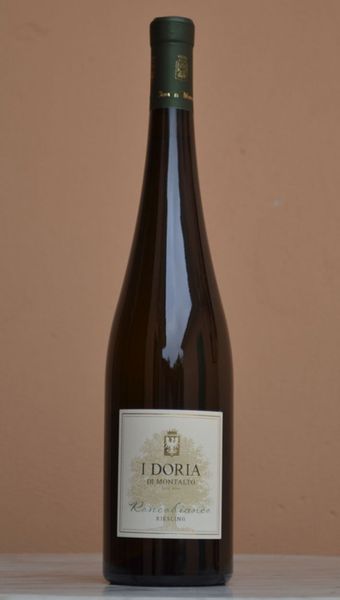
Grapes: 100% Rhine Riesling
Roncobianco Riserva 2015
This vine is typical of Oltrepò, so much so that it is known in Italy as one of the best production areas for sparkling wine bases, especially for Pinot Noir, but few have any knowledge of the excellent potential for Rhine Riesling. As early as the 18th century, Oltrepò straddled two worlds and two different wine-making cultures, Franco-Piedmontese and Austrian, conveyed by the Administration of the Lombard-Veneto Kingdom, which made the hilly Apennine territory of the Pavia area “multi-vocational”. The unification of Italy and the political-military victory of the Savoy family effectively annulled the oenological expertise of the Austrian school even in our own home; but in a reinterpretation of sparkling wine vinification from an organic point of view, it was revealed that Rhine Riesling lends itself well to sparkling wine production due to its high starting acidity, low pH and the right alcohol content, analytical characteristics that are the key to the production of good sparkling wines. The Austrian agronomists working with their oenological culture, in Oltrepò, found the right answers for the refined quality of their Rhine Riesling grapes and wines in the soils of the Montalto hills. The Doria family, producers of grapes and wines since 1800, and organic producers already active before the Wars of Independence, intended to re-propose a sparkling wine that wanted to tell this story and become a vestige of the Austrian occupation of Lombardy. The careful cultivation of the vineyard in "organic" farming and the management system optimised by the long experience on very suitable soils allows for an original vinification, which has always been carried out in the company and handed down to a few and expert Masters of the cellar. It allows it to maintain high characteristics from sparkling wine and inhibit the typical aromatic characteristics of Riesling, which, when young, displays citrus and sage aromas.
Colour:
gold with slight oxidative notes that lead to honey.
Fragrance: takes on the typical balsamic notes of sage but dominated by notes linked to TDN (flint and hydrocarbon notes), which manifest themselves in a more concrete way on "warm" vineyards with late harvest.
Flavour:
savoury, strongly influenced by the fine and elegant structure that highlights the acidic note; long and persistent on the palate. Longevity.
The recommended serving temperature is 18°-20°C.
Pairing
A wine with clear notes of sage, together with the warm-acid notes of lactic acid, is suitable in combination with white meat, seabed fish, aged cheese, legume soups, first courses, asparagus risotto, excellent with mushrooms and truffles. Delicious flavours, also due to the soils' characteristics, make Riesling Riserva "Roncobianco" suitable during any meal. It's a wild card at the table.
1800 Riesling Traditional Classic Method
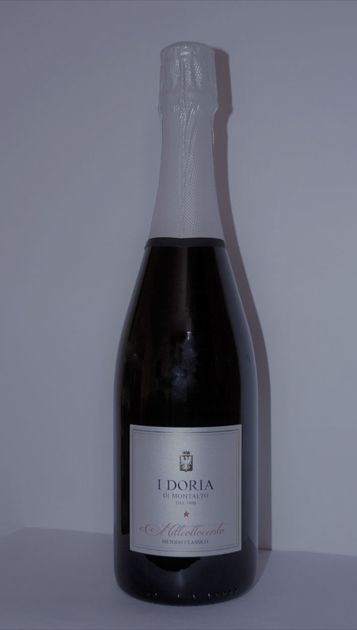
Grapes: 100% Rhine Riesling
Spumante 1800
This vine is typical of Oltrepò, so much so that it is known in Italy as one of the best production areas for sparkling wine bases, especially for Pinot Noir, but few have any knowledge of the excellent potential for Rhine Riesling.
As early as the 18th century, Oltrepò straddled two worlds and two different wine-making cultures, Franco-Piedmontese and Austrian, conveyed by the Administration of the Lombard-Veneto Kingdom, which made the hilly Apennine territory of the Pavia area “multi-vocational”.
The unification of Italy and the political-military victory of the Savoy family effectively annulled the oenological expertise of the Austrian school even in our own home; but in a reinterpretation of sparkling wine vinification from an organic point of view, it was revealed that Rhine Riesling lends itself well to sparkling wine production due to its high starting acidity, low pH and the right alcohol content, analytical characteristics that are the key to the production of good sparkling wines.
The Austrian agronomists working with their oenological culture, in Oltrepò, found the right answers for the refined quality of their Rhine Riesling grapes and wines in the soils of the Montalto hills on clayey marly soils with a good salt content of marine origin.
The Doria family, producers of grapes and wines since 1800, and organic producers already active before the Wars of Independence, intended to re-propose a sparkling wine that wanted to tell this story and become a vestige of the Austrian occupation of Lombardy.
The careful cultivation of the vineyard in "organic" farming and the management system optimised by the long experience on very suitable soils allows for an original vinification, which has always been carried out in the company and handed down to a few and expert Masters of the cellar. It allows it to maintain high characteristics from sparkling wine and inhibit the typical aromatic characteristics of Riesling.
Colour:
gold with brilliant notes.
Fragrance: takes notes of sage and complemented by notes of bread crust and typical aromatic vegetable notes of Provencal herbs.
Flavour:
savoury, strongly influenced by the bubbles that highlight acidic, long and persistent notes.
Degree: higher than 13°
Medium-term ageing in any case longer than 5 years.
Pairing
A wine with clear notes of sage, together with the notes of bread crust and the warm-acid notes of lactic acid, is suitable in combination with white meat, whole fish, medium-aged cheese, excellent with mushrooms and truffles. Recommended with oysters by top chefs. Delicious flavours, also due to the soils' characteristics, make the 1800 suitable during any meal.
"AD" Nebbiolo Brut classic
organic
organic
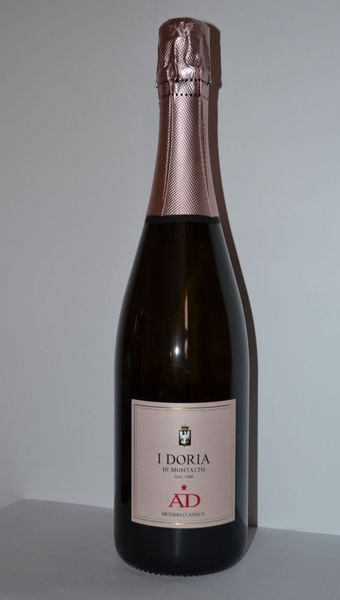
Grapes: 100% Nebbiolo vinified rosé
Spumante AD Nebbiolo
The name A.D. was born in memory of Adriano Doria, a wine-grower-researcher who was one of the first in the method of grape production with sustainable techniques, claiming that "our work must begin with the recovery of old native varieties for the production of great wines".
Varieties that have been selected over the centuries and by humans have been able to express the territory at its best without intervention, if not environmentally friendly. This was possible when there were only preventive techniques for the quality of the grapes passing through the care of the territory and the vineyard to have important oenological results. So much generous work has led to the recovery of our exclusive native Nebbiolo variety, which is located in the South, since it is a late variety. After careful management of the vineyard with permanent grassing and with only winter manure, given the best organic techniques in use, it reaches maturity, to be suitable for AD sparkling wine, the first 10 days of September, when the acidity is still over 11 g/litre The harvest, after a careful selection of bunches, takes place manually in boxes. In the cellar, the first processing is traditional and carried out without the aid of techniques that have an impact on the environment; the careful processing, according to organic logic, involves only natural techniques.
The vinification takes place after a first soft pressing and after static clarification without the aid of cold, it proceeds with natural fermentation.
The malolactic fermentation takes place spontaneously and the wine is aged for over two years in the bottle, also for the second fermentation.
The final phase of ageing on the yeasts involves only a stop in an air-conditioned environment and in this phase, the yeast walls absorb the excess colour.
The disgorgement of the classic method is carried out at least 3 months before being put on the market.
Colour: pinkish, peachy discharge due to early harvesting and non-impacting processing techniques.
Fragrance:
fine, persistent, with pleasant notes of exotic fruit jam a particularly delicate nutty and dried fruit and hazelnut finish.
Flavour:
soft, velvety with good taste-olfactory persistence.
Alcoholic degree: 12,0% Vol.
Pairing
Our classic AD Nebbiolo Brut wine pairs well with white meat, cheese and fish, especially if cooked with vegetables, tomatoes and spicy notes. Excellent with Japanese cuisine.
The combination with spicy flavours is interesting and it can also be paired with spicy peppers.


